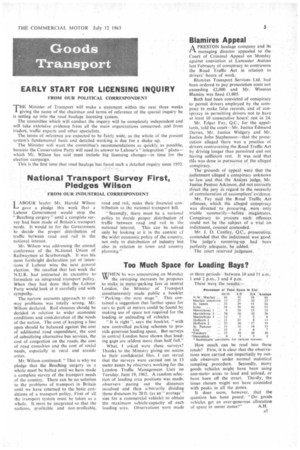National Transport Survey First, Pledges Wilson
Page 7

If you've noticed an error in this article please click here to report it so we can fix it.
FROM OUR INDUSTRIAL CORRESPONDENT
LABOULABOUR 'leader Mr. Harold Wilson a pledge this week' that a Labour Government would stop the " Beeching surgery" until a complete survey had been made of Britain transport needs. It would be for the Government to 'decide the proper distribution of traffic between road and rail in the national interest_ Mr. Wilson was addressing the annual conference of the Neticnial Union of Railwaymen at Scarborough. It was his most forthright declaration yet of intentions if Labour wins the next general election. He recalled that last week the had instructed its executive toformulate an integrated transport polies,. When they had done this the Labour Party would look at it carefully arid with sympathy.
The narrow accounts approach to railway problems was totally wrong. Mr. Wilson declared. Rail closures should be decided in relation to wider economic conditions and cons:deration of the needs of the nation. The cost of keeping a line open should be balanced against the cost of additional road expenditure, the cost of subsidizing alternative bus services, the cost of congestion on the roads, the cost of road casualties and the cost of social needs, especially in rural and seaside areas.
Mr. Wilson continued: " That is why we pledge that the &ceiling surgery as a whole must be halted until we have made a complete survey of the transport needs of the country. There can be no solution to the problems of transport in Britain until we have returned to the basic conditions of a transport policy. First of all the transport system must he taken as a whole. It must be integrated so that the sections, profitable and non-profitable, road and rail, make their financial contribution to the national transport bill.
"Secondly, there must be a national policy to decide proper distribution of traffic between road and rail in the national interest. This can be solved only by looking at it in the context if the wider economic policy of the country, not only in distribution of industry but also in relation to town and country planning."




















































































































